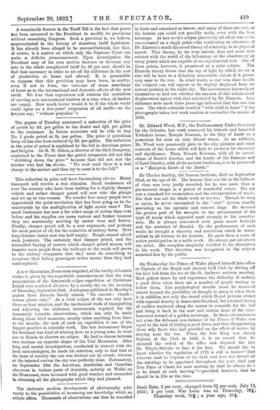A new illustration, if one were required, of the vanity
of human wishes is given by the regrettable announcement that the long preparations of the Greenwich eclipse expedition at Christmas Island were rendered abortive by a cloudy sky on the morning of Thursday, September 21st. A telegram published in Monday's papers from Batavia briefly stated, "No success : clouds : corona photo only." As a total eclipse of the sun only lasts three or four minutes, and the mechanical work of transporting and adjusting the elaborate instruments required for the immensely valuable observations, which can only be made during these brief moments, usually takes anything from three to six months, the task of such an expedition is one of the biggest gambles in scientific work. The late Astronomer Royal for Scotland was fond of relating how, as a young man, he went out to Russia to observe an eclipse. He had to choose between two stations on opposite slopes of the Ural Mountains. After long and careful investigations, conducted in concert with the local meteorologists, he made his selection, only to find that at the hour of totality the sun was blotted out by clouds, whereas at the rejected station the sky was perfectly clear. Fortunately, on September 21st the American, Australian and Canadian observers in various parts of Australia, notably at Wollal on the West coast, were favoured with good weather and succeeded in obtaining all the photographs which they had planned.


































 Previous page
Previous page